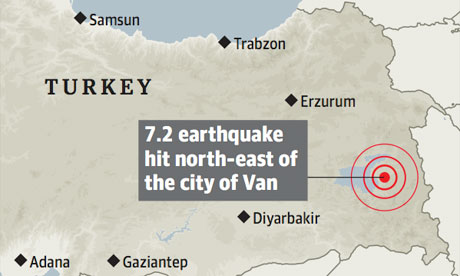Towns of Ercis and Van in mountainous region of eastern Turkey appear to be worst affected by 7.2 magnitude quake


Hundreds are feared dead after a 7.2 magnitude earthquake struck a mountainous region of Turkey. Image: Finbarr Sheehy. Click on the image to see a larger version
More than 100 people are dead and hundreds more casualties are feared after a powerful earthquake hit eastern Turkey, destroying scores of buildings and leaving many victims trapped in the rubble.
Scientists from Turkey's Kandilli earthquake institute said that up to 1,000 people may have lost their lives given the force of the 7.2-magnitude quake, which struck at 1.41pm local time (11.41am BST), and given the often shoddy construction standards in the mountainous area near Turkey's border with Iran.
The US Geological Survey said last night an aftershock of magnitude 6.1 also struck the area. The Turkish prime minister, Recep Tayyip Erdogan, visited the area and said 138 people were confirmed dead in the towns of Van and Ercis.
In Ercis, a town of about 75,000 people, up to 80 buildings collapsed, including a student dormitory, and hospitals reported receiving about 1,000 casualties. In Van, at least 10 buildings were razed. TV footage showed distraught relatives waiting by a collapsed eight-storey building which had shops on the ground floor.
The epicentre of the first quake was a village about 15 miles north of Van, the Kandilli institute said.
The mayor of Ercis, Zulfukar Arapoglu, said many other buildings had been badly damaged, a particular risk with dozens of aftershocks still shaking the region, and added that the town urgently needed tents. The need for shelter is acute – Van is 1,750m (5,740ft) above sea level and nighttime temperatures are near freezing.
Residents in Van and Ercis lit campfires, preparing to spend the night outdoors while the Red Crescent began setting up tents in a stadium. Others sought shelter with relatives in nearby villages.
Rescue efforts went deep into the night under generator-powered floodlights. Workers tied steel rods around large concrete slabs in Van, then lifted them with heavy machinery. Erdogan urged residents to stay away from damaged buildings and promised assistance to all survivors. "We won't leave anyone to fend for themselves in the cold of winter," he said. Around 1,275 rescue teams from 38 provinces were being sent to the region, officials said, and troops were also assisting search-and-rescue efforts.
In Ercis, heavy machinery halted and people were ordered to keep silent as rescuers tried to listen for possible survivors inside a seven-story building housing 28 families, NTV reported.
The foreign secretary, William Hague, said Britain was ready to provide Turkey any assistance it needed. "We stand with Turkey at this difficult time," he said.
The Israeli president, Shimon Peres, also offered the Turkish government any assistance it required.
It was reported that some inmates escaped a prison in Van after one of its walls collapsed. TRT television said about 150 inmates fled, but a prison official said the number was much smaller and many later returned after checking that their families were in good health.
Casualties were also reported in Celebibag district, near Ercis. "There are many people under the rubble," Veysel Keser, the mayor of Celebibag, told NTV. "People are in agony. We can hear their screams for help. We need urgent help."
The quake was also felt in Yerevan, the capital of Armenia, and several Iranian towns close to the border, but there were no reports of injuries or damage.
Earthquakes are common in Turkey, which is crossed by a number of faultlines. The most significant one in recent years struck the western city of Izmit in 1999. The official death toll was 17,000, although some reports suggested the real figure was higher. Poorly built housing was blamed for many deaths, and tens of thousands more people were left homeless as other buildings were damaged beyond repair.
The head of Turkey's search and rescue organisation, Nasuh Maruki, said his staff had learned a lot from the 1999 quake and were now far better able to assist. However, he added, poorly-built buildings were likely to remain a problem: "They will all have to be strengthened to withstand earthquakes or they will have to be demolished and built from scratch."

No comments:
Post a Comment